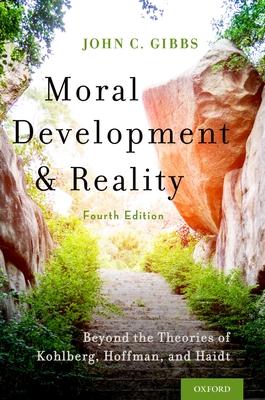Moral Development and Reality explores the nature of moral development, human behavior, and social interconnections. The exploration elucidates the full range of moral development, from superficial perception to a deeper understanding and feeling through social perspective-taking. By comparing, contrasting, and going beyond the key theories of preeminent thinkers Lawrence Kohlberg, Martin Hoffman, and Jonathan Haidt, John C. Gibbs tackles vital questions: What exactly is morality and its development? Can the key theoretical perspectives be integrated? What accounts for prosocial behavior, and how can we understand and treat antisocial behavior? Does moral development, including moments of moral inspiration, reflect a deeper reality?
This fourth edition of Moral Development and Reality is thoroughly updated, refined, and expanded. A major addition considers Paul Bloom’s important challenge to Hoffman’s theory. This book will have broad appeal across academic and applied disciplines in psychology, education, and the helping professions. Complete with case studies and chapter questions, it serves especially well as a text in advanced undergraduate and graduate courses in social/developmental psychology and human development.
| FindBook |
有 1 項符合
Moral Development and Reality: Beyond the Theories of Kohlberg, Hoffman, and Haidt的圖書 |
 |
Moral Development and Reality: Beyond the Theories of Kohlberg, Hoffman, and Haidt 作者:Gibbs 出版社:Oxford Univ Pr 出版日期:2019-05-02 語言:英文 規格:平裝 / 15.9 x 23.5 x 2.5 cm / 普通級/ 再版 |
| 圖書館借閱 |
| 國家圖書館 | 全國圖書書目資訊網 | 國立公共資訊圖書館 | 電子書服務平台 | MetaCat 跨館整合查詢 |
| 臺北市立圖書館 | 新北市立圖書館 | 基隆市公共圖書館 | 桃園市立圖書館 | 新竹縣公共圖書館 |
| 苗栗縣立圖書館 | 臺中市立圖書館 | 彰化縣公共圖書館 | 南投縣文化局 | 雲林縣公共圖書館 |
| 嘉義縣圖書館 | 臺南市立圖書館 | 高雄市立圖書館 | 屏東縣公共圖書館 | 宜蘭縣公共圖書館 |
| 花蓮縣文化局 | 臺東縣文化處 |
|
|
圖書介紹 - 資料來源:博客來 評分:
圖書名稱:Moral Development and Reality: Beyond the Theories of Kohlberg, Hoffman, and Haidt
|











